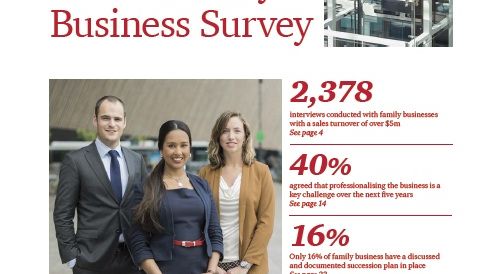
Press release -
PwC family business survey shows need to ‘professionalise’ the family as well as the business
PwC family business survey shows need to ‘professionalise’ the family as well as the business
· Family businesses remain a dynamic and resilient segment, but competition more intense, price pressures growing, speed of change accelerating
· Succession is more hazardous than ever, with only 16% globally and 11% locally claiming to have a robust succession process
· Almost a third (32%) of Singapore respondents indicated plans to sell or float business
Singapore, 23 October 2014 -- Family businesses must adapt faster, innovate sooner and become more professional in the way they run their operations if they are to remain successful. These are just some of the findings of the latest PwC survey of 2,378 family business executives in more than 40 countries worldwide.
The report – titled Up close and professional: the family factor – is PwC’s seventh survey of family businesses globally, this year covering more companies and markets than ever before.
One eye-catching finding from this year’s survey is that the need to professionalise the business is gaining ground as a key concern for family firms, driven by an almost perfect storm of competitive pressure, rising costs and global megatrends. It scarcely registered in 2012, but this year 40% of respondents globally agree this is a key challenge over the next five years. And it must be accompanied by an equally rigorous approach to professionalising the family.
Overview of Singapore findings
Overall, this year’s survey indicates that – despite a tough economic environment, with pressures around skills shortages, innovation and governance – family firms across the globe remain dynamic and resilient. Indeed, family businesses account for 70 - 90% of GDP globally, and are an effective barometer of the health of the economy.
In Singapore, the value of family businesses goes beyond the monetary – often playing a significant role in building the Singapore brand. In addition, these business owners continue to feel a strong sense of responsibility to supporting employment and retaining staff even in bad times. However, juxtaposed to this, Singapore respondents were less likely to recognise that they hold key advantages over non-family businesses, in particular with regards to adding stability to the economy and in job creation. While 73% of global respondents agreed that family businesses add stability to a balanced economy, only 42% of respondents in Singapore thought so.
Professionalising the family
But getting the business on a professional footing is not in itself enough; it has to be accompanied by an equally rigorous approach to professionalising the family. This means, for example, putting processes in place to govern how the family interacts with the business – including establishing an infrastructure for decision-making and formal channels for communication. These will be essential during times of tension or conflict. It’s about protecting the family’s interests, and safeguarding the firm’s survival.
Singapore respondents generally had less procedures in place to deal with family conflicts, implying that they are less prepared to deal with them. Across the nine procedures listed in the survey, Singapore respondents only fared better than the global average in one procedure – Measuring and appraising performance.
Commenting on findings relating to Singapore respondents, Mr Ng Siew Quan, Entrepreneurial & Private Clients Leader, PwC Singapore, said:
“Beyond professionalising the family business and the way it’s run, Singapore family business owners need to think about professionalising the family. This can help with succession planning and leadership development, establish rules of engagement and set up a necessary structure for proper governance and accountability. These are crucial for family wealth planning and for continued success of the family business.”
More competitive, more volatile
Globally, family businesses are in reasonably good shape, with 65% reporting growth in the last 12 months, and 70% expecting to grow steadily over the next five years. 15% are seeking aggressive growth, compared to 12% in 2012. Growth ambitions are particularly strong in China (57%), the Middle East (40%) and India (40%).
In Singapore, respondents are generally less confident about future growth. They envisage a tougher business environment in 2014 as compared to 2012. Compared to 2012, an increase of 9% of Singapore respondents predicted that they would consolidate or shrink (19% in 2014; 10% in 2012). In addition, there was a 9% drop in the number of respondents from 90% in 2012 to 79% in 2014 who indicated that they were confident of growth either steadily or quickly and aggressively.
Mr Ng Siew Quan, Entrepreneurial & Private Clients Leader, PwC Singapore, said:
“It’s clear that there are new challenges; the economy is a colder and harder place for the family firm, competition is more intense, price pressure is growing, and the speed of change continues to accelerate. In this climate, family businesses accept they will have to adapt faster, innovate earlier, and become far more professional in the way they run their operations.”
The digital imperative
In this year’s PwC Global CEO Survey, 81% of those questioned cited technological advances as one of the top three global trends most likely to transform their business over the next five years. And family businesses similarly recognise the growing impact of digital technologies, with 79% placing this in the top three trends globally.
A high 72% of family business respondents across the globe accept they will have to adapt the way they operate externally, and organise themselves internally, to exploit the full opportunities of digital and avoid being overtaken by more advanced competitors. Singapore is in line with this average, also with a score of 72%.
In addition, Singapore ranks higher (72%) in the area of recognising that going digital will help raise awareness of their organisation, as compared to the global average of 64%.
Making a success of succession
Nowhere is this professional approach more critical than when it comes to the all-important issue of succession. Far too many family businesses have still not fully grasped this potentially destructive issue. Globally, 53% say they have succession plans in place for some if not all senior roles, but only 30% of these ‘plans’ are properly documented. Only 16% say they have a robust succession process.
Only 11% of Singapore family businesses surveyed have a succession plan that is robust and documented. On top of this, 32% of Singapore respondents indicated that they are planning to sell or float their businesses, compared to a lower percentage of 20% globally.
Mr Ng Siew Quan, Entrepreneurial & Private Clients Leader, PwC Singapore, said:
“A plan that is not written down is not a plan; it’s just an idea. And this is an issue family firms must address with the same commitment and energy as they are devoting to professionalising other aspects of the business. Because without it, the whole enterprise is at stake.
“This could be why more family businesses surveyed here are indicating that they plan to sell. If the business owners are not confident of their succession planning, the easier option would be to liquidate and exit the market.”
Ends
Notes:
1. The 2014 PwC family business survey covers family companies with a sales turnover of >US$5m – >US$1bn in over 40 countries. Interviews with top executives in 2,848 companies took place between 29th April and 29th August. For reporting purposes we included responses from 2,378 respondents. There were 53 respondents from Singapore.
2. The report on the findings of the family business survey, Up close and professional: the family factor, can be downloaded at www.pwc.com/sg/family-business-survey.
Topics
Categories
About PwC
PwC helps organisations and individuals create the value they’re looking for. We’re a network of firms in 157 countries with more than 184,000 people who are committed to delivering quality in assurance, tax and advisory services. Tell us what matters to you and find out more by visiting us at www.pwc.com.
PwC refers to the PwC network and/or one or more of its member firms, each of which is a separate legal entity. Please see www.pwc.com/structure for further details.
© 2014 PricewaterhouseCoopers. All rights reserved.




